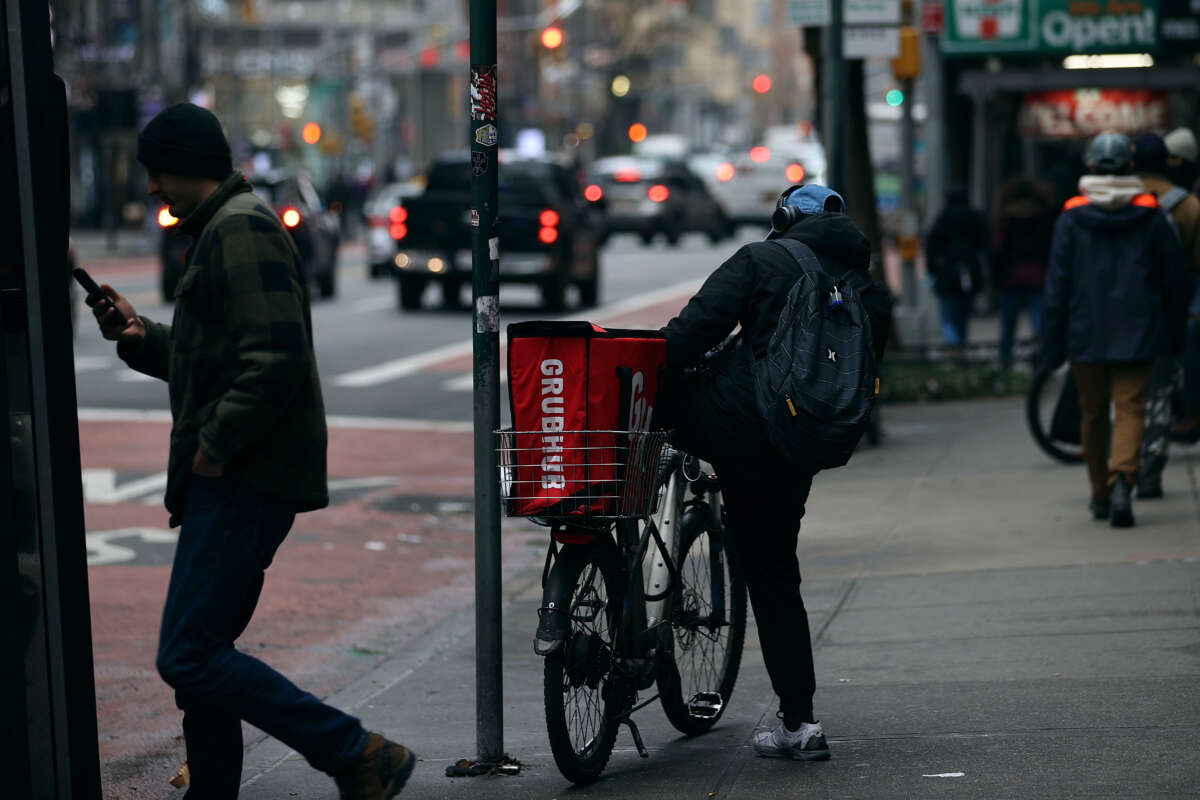On Thursday, Uber Eats, DoorDash and Grubhub sued New York City in an attempt to block a landmark rule ensuring a minimum wage for delivery workers from going into effect on July 12.
The minimum pay rate, which would increase the pay for delivery workers to $17.96 an hour in July and nearly $20 an hour by April 2025, comes after a three-year campaign by Worker’s Justice Project (WJP) and Los Deliveristas Unidos, a worker-led movement to increase pay and improve working conditions for delivery workers in New York City.
“I feel fortunate to have been one of the people who fought for a better life for ourselves, and so that delivery workers can be finally recognized and be treated to a life with dignity,” Sergio Ajche, co-founder of Los Deliveristas Unidos, said when the rule increasing the pay for delivery workers was announced.
Because app-based delivery workers are classified as independent contractors rather than employees, they were not previously entitled to a minimum wage or reimbursements for expenses. Currently, delivery workers make an average of $7.09 an hour in a city before tips, where, according to CNBC, a yearly salary of $78,524 is needed to live comfortably in the metro area.
In September 2021, the New York City Council passed a law requiring the New York City Department of Consumer and Worker Protection (DCWP) to study and report on the pay and working conditions of New York City’s more than 60,000 delivery workers. After reviewing the findings of the study, the Adams administration announced the minimum pay rule — the first of its kind in the country.
“Our delivery workers have consistently delivered for us — now, we are delivering for them,” Mayor Adams said in a statement announcing the DCWP’s new rule. “This new minimum pay rate, up by almost $13.00/hour, will guarantee these workers and their families can earn a living, access greater economic stability, and help keep our city’s legendary restaurant industry thriving.”
The rule was celebrated by worker advocacy groups and delivery workers in the city, who have been organizing for better pay and working conditions for years.
“This rule will set the pay floor for all the essential deliveristas who work tirelessly — whether through a pandemic, a snowstorm or wildfire smoke — and who have been denied a living wage for far too long,” said Ligia Guallpa, executive director of WJP. “While there’s still work to do, a minimum pay rate for food delivery workers will transform the lives of thousands of families across the city and deliver long overdue justice for deliveristas.”
The lawsuit against the city, which alleges that the rule is unfair to the companies’ business models and is based on flawed calculations, is only the most recent attempt by Uber Eats, DoorDash and Grubhub to block the wage increase. Though the minimum pay standards were supposed to go into effect in January, the Adams administration caved to vocal pushback from the companies, reopening the rulemaking process and inviting public comment.
DCWP Commissioner Vilda Vera Mayuga has responded to the lawsuit by promising that the city remains committed to ensuring that delivery workers are paid fair wages.
“Delivery workers, like all workers, deserve fair pay for their labor, and we are disappointed that Uber, DoorDash, GrubHub, and Relay disagree. These workers brave thunderstorms, extreme heat events, and risk their lives to deliver for New Yorkers — and we remain committed to delivering for them,” Mayuga said. “The minimum pay rate will help uplift thousands of working New Yorkers and their families out of poverty. We look forward to the court’s decision and to apps beginning to pay these workers a dignified rate starting July 12.”
WJP and Los Deliveristas Unidos have condemned the lawsuit, calling it an unconscionable legal maneuver to prevent app-based delivery workers from earning a living wage.
“We will continue to organize, fight and defend the right to earn a fair and livable wage in our city,” the worker advocacy groups said in a statement.
Speaking against the authoritarian crackdown
In the midst of a nationwide attack on civil liberties, Truthout urgently needs your help.
Journalism is a critical tool in the fight against Trump and his extremist agenda. The right wing knows this — that’s why they’ve taken over many legacy media publications.
But we won’t let truth be replaced by propaganda. As the Trump administration works to silence dissent, please support nonprofit independent journalism. Truthout is almost entirely funded by individual giving, so a one-time or monthly donation goes a long way. Click below to sustain our work.
